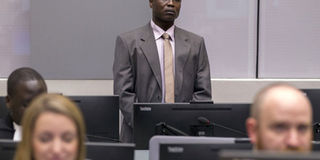ICC, prioritise justice of renewal

Dominic Ongwen
With the trial of Dominic Ongwen taking full shape following the resumption of the trial on September 18, 2018, seemingly the unilateral imposition of punishment on the offender consistent with what is believed the offender deserves is looming. And more focus should now be on the re-establishment of a renewed value consensus, through the reaffirmation of values violated by the transgression by the LRA on the communities concomitant with the establishment of the International Criminal Court (ICC) that resulted in the creation of the Trust Fund for Victims (TFV) as the global movement to end impunity for the gravest of crimes and alleviate suffering under Article 79 of the Rome Statute.
For the victims of crimes against humanity, war crimes and genocide whose voices are often left unheard and whose suffering is forgotten, the Court set forth two mandates of the TFV to implement Court-ordered reparations and to provide physical and psychosocial rehabilitation or material support to victims of crimes that fall within the jurisdiction of the Court.
Since then, 18 districts in northern Uganda has benefited in isolated projects that ended in 2017.
The Court needs a heavier investments in concert with NGOs, academic and research institutions, and government entities to put up symbolic and service-based collective reparations like community museums, the construction of community centres and invest in programmes featuring activities meant to reduce stigma and discrimination that former child soldiers continue to face in the communities where they reside.
Individual compensation award inform of cash transfers, and other collective awards in the form of housing assistance, education assistance, and income generating activities.
For the service-based collective reparations, physical and psychological rehabilitation centres for inter alia medical referral services reconstructive surgery; screening for physical injuries, providing treatment, care and support to war victims will go a long way. This will provide victim/survivors with an extensive degree of physical healing, which enables them to function as normally as possible in their communities and to re-engage in regular community life. Physical rehabilitation is a highly promising means to attempt to restore the normalcy of daily life (as much as is possible) in post-conflict settings.
For the youth vocational training activities; both individual and group-based trauma counselling; music, dance and drama groups to promote social cohesion and healing; community sensitisation workshops and dialogues; radio broadcasts on victims’ rights, and information sessions should be part of the bigger plan.
Johnson Okwera,
[email protected]




